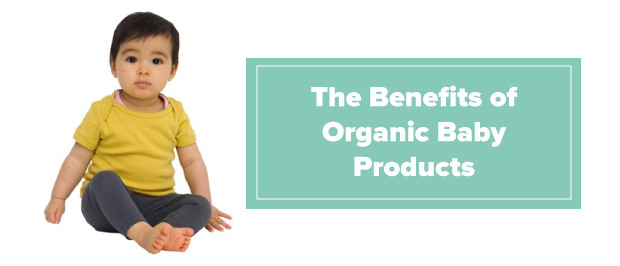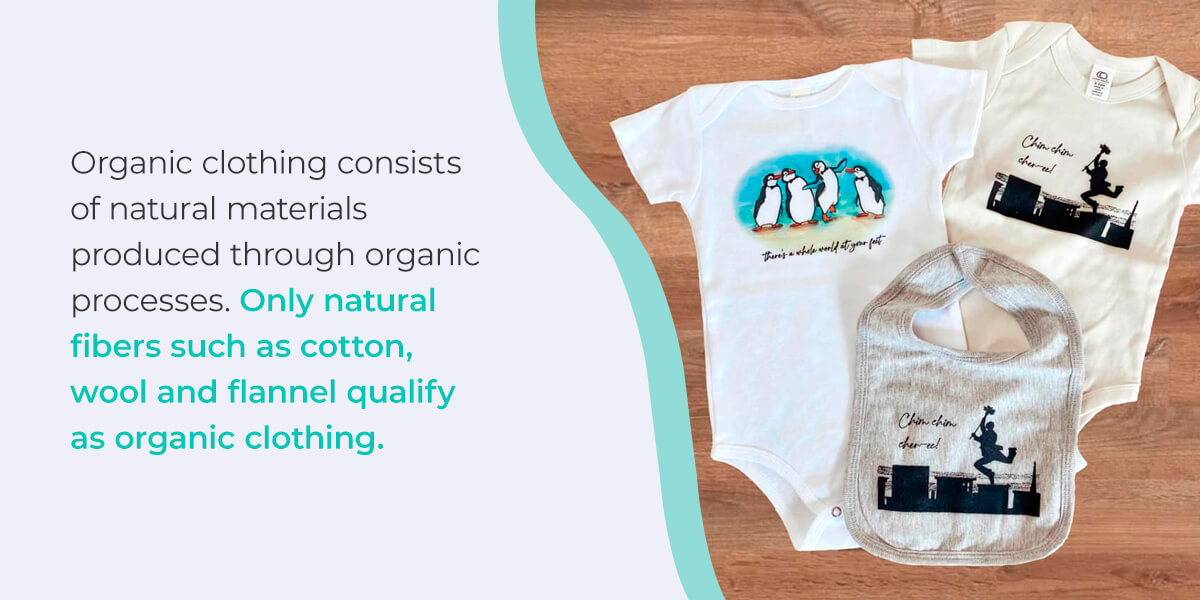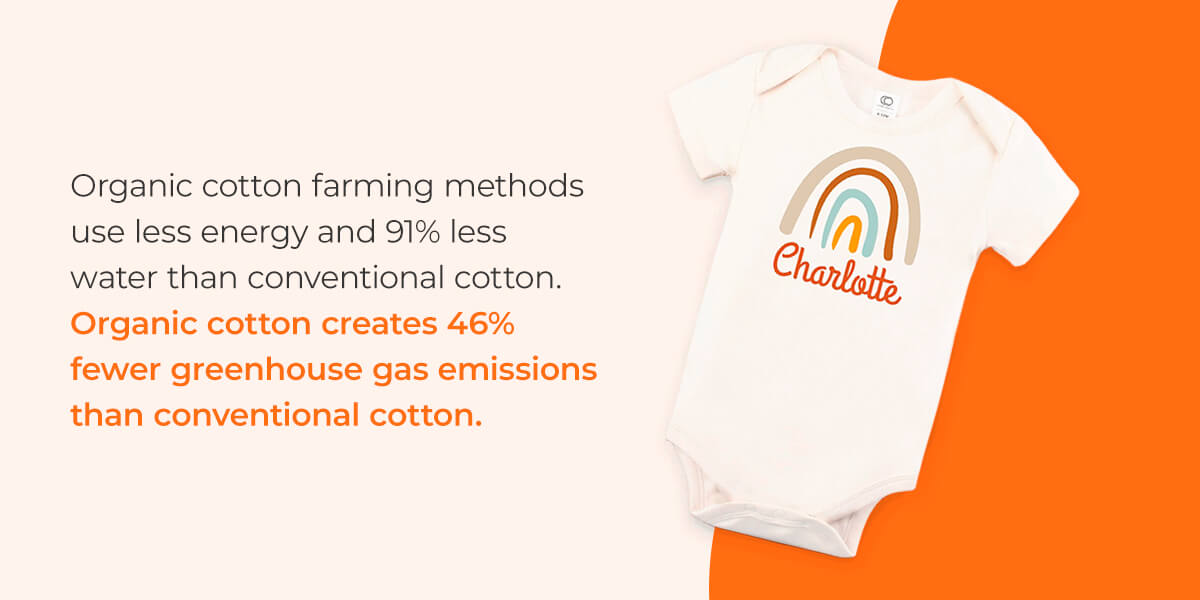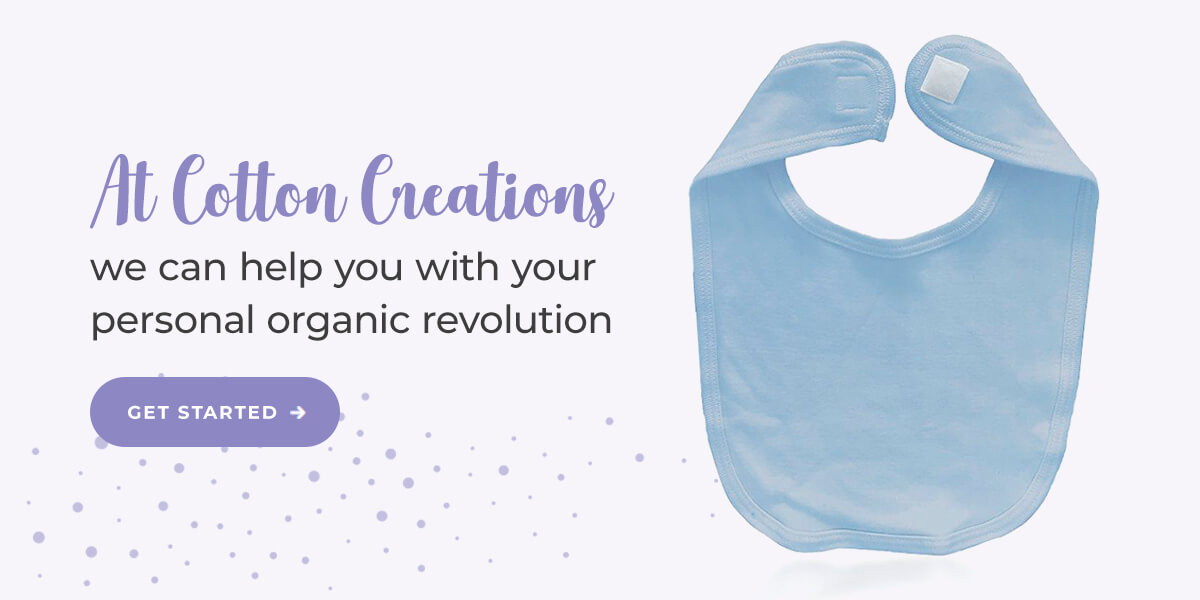
The Benefits of Organic Baby Products
The Benefits of Organic Baby Products
Babies come with boundless joy and precious moments, but parenthood also comes with significant decisions and worries — Are they getting enough tummy time? Is formula OK, or should I breastfeed exclusively? How do I know if a day care is safe and high-quality? Is organic clothing better for babies?
In the always-connected age of technology, new parents see a steady stream of articles and posts about what they should and shouldn’t do. Those articles often serve up conflicting views, each citing different statistics to prove how correct they are. It’s easy to feel overwhelmed or worry you could harm your baby if you don’t make the right choices.
Have peace of mind that you are already doing your part to make the best decision for your baby by researching the different advantages of clothing for babies, including the organic versus conventional debate. Staying informed on these topics is the best thing you can do for your child.
Check out these benefits of organic baby products to determine if you should switch.
The Organic vs. Non-Organic Debate
As a parent, you face many decisions, from feeding techniques to stay-at-home parenting versus sending your child to day care. The truth is, babies on both sides of these debates can go on to lead happy, healthy lives. Discussions often inspire passionate pro and con positions, and organic versus conventional is no exception to this discourse.
Deciding whether to spend more on organic products is often a dilemma for parents.
On one side, you have the pro-conventional group that asserts organic products are no healthier than conventional products. They say the pesticides and other chemicals used in traditional processes don’t pose any health or safety risks. This group often points to the higher cost of organic products, which they believe are not worth it. The pro-conventional group has quotes, studies and statistics to back up their claims.
On the pro-organic side of the debate, you have people who raise concerns about the chemicals often used in conventional products. This group points out adverse effects on the personal and family levels and on a grander scale regarding the environmental impact of using those chemicals. They point out that the cost difference for many organic products is minimal, and the investment is worth the health benefits. The pro-organic group also shows up to the debate armed with quotes, studies and statistics to support their positions.
Other people fall somewhere in the middle — wanting to lead an organic life but wondering if the investment is worthwhile. No matter where you fall on the spectrum, understanding the benefits of organic baby products helps you make the best decision for your family, despite what other parents might say

Why Should Babies Wear Organic Clothing?
As a parent, you understand the number of onesies a baby can go through on any given day. From spit-up incidents to leaky diapers, you constantly have to change your baby’s clothes. But does it matter if the clothing is organic? Is organic clothing better for babies, and what makes clothing organic?
Organic clothing consists of natural materials produced through organic processes. Only natural fibers such as cotton, wool and flannel qualify as organic clothing. Organic clothing generally shouldn’t have chemicals or synthetic products in any part of the processing, from growing to manufacturing.
The Global Organic Textile Standard regulates organic fabrics worldwide. It ensures a socially and environmentally responsible textile manufacturing process, as products must pass strict inspections and regulations throughout the supply chain. The GOTS can give consumers peace of mind that they are using genuinely organic products.
So, are organic baby clothes worth it? The decision ultimately comes down to you, but here are a few benefits of buying organic baby clothes for your child.
Eliminates Chemicals Near Your Baby’s Skin
Compared to conventional cotton manufacturing, organic clothing is better for babies because it doesn’t use chemicals. Babies have more permeable skin, which absorbs much more of their environment than adults. Their delicate, thin, porous skin quickly absorbs things it comes in contact with — including clothing. As a result, it makes sense to reduce or eliminate chemicals in these materials to keep them away from your baby and protect their health.
Organic clothing certified by GOTS regulates the use of chemicals on the product. The standard ensures textile processors do not use harmful chemicals in their products, including organic clothing for your baby.
By choosing organic clothes, you reduce the chemicals that can enter your baby’s body, lowering the overall risk for your little one.
Same Benefits as Conventional Clothing
Organic baby clothes have all the same benefits as conventionally produced ones. They are soft, absorbent when necessary and adorable. The only thing you miss out on when you choose organic baby clothes is the potentially harmful effects of chemicals used during processing.
Less Irritation
Organic cotton protects and nurtures your baby’s tender skin. The chemicals and additives used in conventional baby products can cause irritation. Some babies have more sensitive skin than others, especially regarding the chemicals used during fabric processing. You might be surprised to find that switching to organic clothes could clear up ongoing irritation or rashes if the chemicals in conventional clothing are the cause.
Soft, breathable organic cotton is the closest match to your baby’s skin. It preserves the cotton fibers’ natural qualities to protect developing skin.

Better for the Environment
Organically made products have a smaller carbon footprint. They reduce the chemicals introduced into the environment, including the air and groundwater on and around the area.
Organic cotton farming methods use less energy and 91% less water than conventional cotton. Farmers nurture the soil, making it fertile for extended periods and locking in carbon dioxide. Organic cotton also creates 46% fewer greenhouse gas emissions than conventional cotton. Strict GOTS regulations prohibit hazardous chemicals, mandating that manufacturers treat wastewater to protect the water supplies.
Benefits Farmers and Factory Workers
Employees of organic companies work in a healthier environment without exposure to dangerous chemicals, helping protect their families and communities from toxic pesticides. Similarly, with organic farming, farmers won’t need to invest in insecticides, which are costly and detrimental to sustainable and ecological agriculture.
Increased Availability
Not that long ago, organic clothes were difficult to find. However, as more people gain awareness of the benefits of organic clothing, these products are becoming more readily available. The expanded selection makes it easier to find the clothes you want.
Helps Change the Course of the Clothing Industry
Switching to GOTS-certified organic clothing helps you reduce your carbon footprint and show support for our planet, health and social issues. When we support organic farming, we help bring more awareness and create conscious consumers and clothing manufacturers who care about doing the right thing.
More responsible clothing companies can help avert climate change and warrant a safer and better future for our children and our environment.
Benefits of Organic Cotton for Babies
Cotton is one of the most widely available organic fabrics. Cotton feels soft on your baby’s skin and is not likely to cause an allergic reaction. It’s durable for products like bibs and bedding, and it is absorbent in burp rags and other similar products. If you choose to go the cloth diaper route, cotton can supply the absorbency — but this material also comes with some dirty statistics.
Cotton makes up about half of the fiber used in clothing and textiles. Approximately 8,000 synthetic chemicals turn raw materials into textiles, contributing to 20% of global water pollution from treating and dyeing them. All these chemicals significantly impact individual consumers and our shared planet.
While conventional cotton has some downsides, organic cotton shows promise for your baby’s clothing and other textiles. Here are some benefits of organic cotton.
- Grown without traditional pesticides: Chemical-free clothes are better for babies than traditional cotton. They also benefit the environment by eliminating pesticide runoff that can damage habitats and reach groundwater supplies. Organic cotton growers use techniques such as crop rotation and manual weed removal to protect the crops.
- Soft to the touch: Cotton is a comfortable fabric, perfect for clothing and bedding. Organic cotton does not lose any of that softness, so you can feel confident dressing your baby in organic cotton clothes.
- Increased durability: Organic cotton is a durable fabric, since chemicals don’t damage the fibers. As a result, it will last longer after many washes than conventional cotton. That means you get more use out of organic cotton products — and we already established you’ll be doing a lot of laundry with a baby in the house. While you pay more upfront, the extended wear gives you a better value for your money over conventional cotton products.
Diapers are another area of concern for many new parents. Cloth diapers made from organic cotton give you peace of mind if you’re concerned about chemicals in traditional diapers. If you want to avoid the extra effort associated with using organic cotton cloth diapers, many brands now offer organic disposable diapers or disposable diapers with fewer chemicals.
Organic Baby Food — Is It Better?
Reaching the solid food stage is an exciting milestone for you and your baby, but it brings up another question — should I buy organic baby food? Like any other organic product, it’s a personal decision with some pros and cons to consider.
Why choose organic baby food? Check out these benefits.
- Clean ingredients: Organic foods don’t contain dyes that are often ingredients in conventional baby foods and snacks. Dyes offer no nutritional value and can include potentially harmful chemicals. Organic foods may use natural food products to add coloring without the dangerous effects.
- Better nutritional value: Food goes directly into your baby’s body, so it stands to reason that their diet should be a priority if you want to reduce their exposure to pesticides, herbicides and other chemicals.
- Health and wellness: Your baby’s system is still developing, and offering pure, chemical-free food gives them the best foundation for growing up healthy and strong. Babies are often sensitive, and keeping potentially irritating ingredients out of food can help reduce upset stomachs.
- Taste: Many people think organic foods taste better than conventional foods. While this is a personal preference, you may find you and your baby prefer the flavor of organic foods.
On the flip side, consider these potential negatives of choosing organic baby food.
- Cost: Organic baby food and formula typically cost more than their conventional counterparts. For families on a limited budget, that cost can seem prohibitive. Not all organic food is highly priced, though. With greater demand for organic products, you can find many different brands at varying price points to help meet your budgetary needs. Sticking with more affordable foods and brands helps you feed your baby organic food without blowing the budget.
- Limited options: While organic food is becoming more readily available than ever, conventional products still dominate the market. Some organic foods are only available during specific seasons, since farming crops without genetic modifications means they can’t always grow year-round. Generally, you can find or make your organic baby food products with enough variety to satisfy your baby.
- No nutritional difference: Organic foods may eliminate chemicals, but they do not provide any extra nutritional value. Your baby can get the same nutrients from conventional baby foods as they do from the same organic products.
If cost is the primary factor stopping you from choosing organic baby food, try making it from scratch using organic fruits and vegetables. You can often find seasonal organic fruits and vegetables at reasonable prices, and making baby food isn’t difficult. Look for inexpensive organic vegetables at farmer’s markets or grow them yourself for a complete seed-to-table experience.
How Can You Be Certain Products Are Actually Organic?
You’ve decided to buy organic, but how do you know you’re getting organic products? The best way is to stick to products labeled as “certified organic.” To earn that label, the product must meet rigorous standards from a third party based on the materials and manufacturing processes.
In the United States, the Department of Agriculture oversees organic certification. Not all cotton comes from the U.S., so other organizations handle organic certifications. For example, SKAL is a Dutch organization that certifies cotton as organic.
You can’t generally tell the difference between organic and conventional products by looking at them. Here are some ways to ensure you are getting the real thing.
- Look for “certified organic” on the label: This phrase ensures the product meets the certifying organization’s requirements.
- Check the color: It seems strange, but color can help determine if something is organic. Since there are limited organic dye options, most organic cotton and clothing items won’t have a wide range of colors, and they may not be as bright or vivid as you’re used to. When you’re checking out organic foods, they should only contain dyes naturally derived from foods such as beets.
- Calculate the cost: As much as we all want a good deal, you’ll have to pay a little bit extra for organic products. If a price seems too good to be true — especially on organic clothes that tend to be significantly higher — it’s possible the product isn’t organic.
- Find well-known organic brands: Do your research to find companies that produce quality organic products, and stick with those brands exclusively.
Make the Organic Switch
Are you ready to join the organic baby movement? You don’t have to immediately change over to a completely organic lifestyle to make a healthy difference for your baby. Even changing a few things reduces the amount of chemicals your baby ingests or absorbs through their skin. Start taking small steps for a gradual shift by incorporating some organic items into your daily routine.
At Cotton Creations, we can help you with your personal organic revolution. Check out our section of organic products to get started.
You Might Also Enjoy
- Your Organic Cotton Baby!
- 6 Things to Make and Give to New Mothers
- Eight Unique Ideas for Your Next DIY Baby Onesie
- Simple Gift Ideas for Baby from Big Brother or Sister
- Planning The Ultimate Baby Shower
- 15 Personalized Baby Shower Gift Ideas
- Ten Scary Good Baby Halloween Costumes
SHARE THIS:


